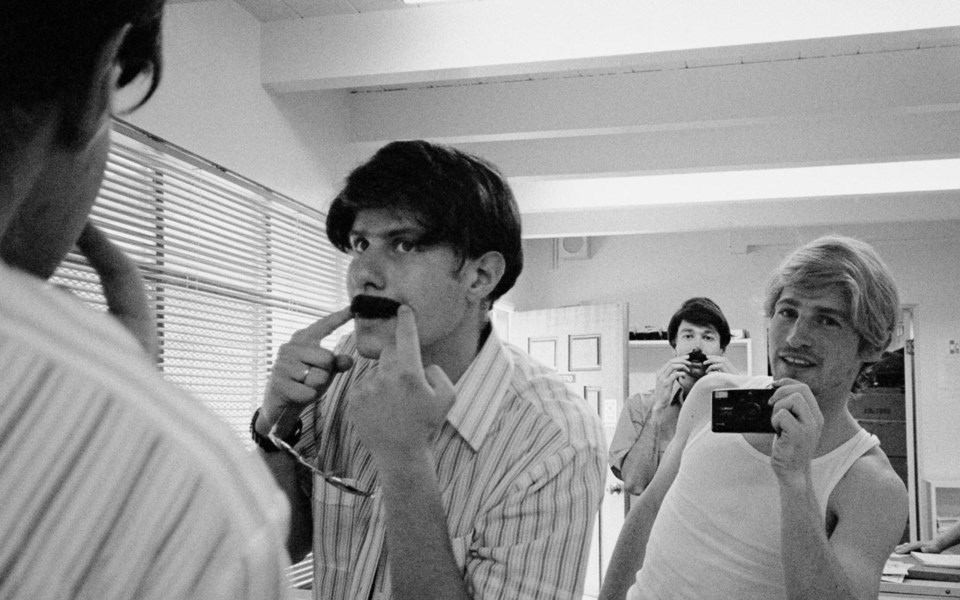Finally, something to get excited about: Spike Jonze's Beastie Boys Story drops Friday on Apple TV+. Based off the 600-plus-page book of the same name released last year, this flick is being described as a "live documentary" which means it's essentially clips of Adam Horovitz and Mike Diamond on stage shepherding live audiences through what's essentially a PowerPoint presentation of their lives in one of the most watchable and respected bands of the past 35 years.
While some critics are deriding the "TED Talk" presentation (who wouldn't want to watch a TED Talk by the Beastie Boys though?), the casual, conversational format provides a unique sense of intimacy, like going through old photo albums with the people who were there, except the photos are also the soundtrack of your life.
There's insight into the early days (yes, that bro-rock vibe was supposed to be parody, even if it eventually took over) and behind-the-music history on how the band was able to continuously re-invent themselves and their music. Much of the credit, it seems, lies with Adam Yauch, aka MCA, whose death from cancer in 2012 brought an untimely end to the group, and to whom much of the film's emotional core is dedicated. While Jonze doesn't totally capture that Beastie trickster spontaneity (Horovitz credits "f*king around" as their lifelong creative process), Beastie Boys Story is still a poignant bit of nostalgia, boosted by the lifelong familiarity and friendship of its subjects. Plus, it's filmed in a packed theatre, for extra quarantine nostalgia. Oh, the warmth of a shared human experience...
Moving on, Quarantino continues and this week, we need to make a short pit stop at Four Rooms, a 1995 anthology flick where four directors each make a chapter of a one-night-in-the-life-of-a-hotel-bellboy story starring Tim Roth. Fresh off Pulp Fiction (and a Palme d'Or at Cannes) Tarantino closes out the film with a 21-minute story set in the penthouse.
While Bruce Willis cameos (alongside Jennifer frickin' Beals), the star of the segment is Tarantino himself, playing the part of a coked-up Hollywood mogul on a rampage to impress everyone in sight. It's some of Tarantino's best acting work, but the segment is also notable for its use of long takes, cinematic references, and Tarantino's insight that, "In America, we might be right once in a while, but we are very rarely fair."
Four Rooms isn't streaming anywhere, but you can rent it on Apple and the Tarantino penthouse segment can be found for free (in terrible quality) on YouTube.
The main event, though, is 1997's Jackie Brown, still the only Tarantino flick to come from another author's source material (Elmore Leonard's novel Rum Punch) and a pretty brilliant follow-up to the madness surrounding Pulp Fiction.
By this time, Tarantino was best known for violence, pop-culture homage, and screwing with the narrative timeline and structure. So he made a traditionally straightforward, character-driven heist flick featuring a middle-aged female black hero, with almost no on-screen violence—though there were plenty of homage to '70s music and film. And despite not living up to global expectations at the time, Jackie Brown makes a damn fine watch because, by Quentin's standards, it's subdued—the right mix of Leonard's brilliant plotting and character with Tarantino's tangential dialogue and style.
And a cast to kill for. Pam Grier (Coffy, Foxy Brown) slays it in the lead role, with legendary character actor Robert Forster (The Delta Force, Mulholland Drive) at her side. Then toss in Sam Jackson as the heavy Ordell (reportedly one of his favourite roles ever) and round that out with Bridget Fonda, Michael Keaton, Chris Tucker (briefly) and Robert De Niro (in an underappreciated performance rich with physical comedy). It's all-time.
Not so much a "whodunit" as a "howshegonna" (how she gonna pull this mofo off?), Jackie Brown is a noir crime set in sunny Hermosa Beach, Calif. that seems occupied with the idea of growing old gracefully.
"I look in the mirror, it still looks like me," Forster's bail bondsman Max Cherry says, later adding, "I'm 56 years old, I can't blame anyone else for anything I do."
Jackie Brown also marks the end of Tarantino's "realism" period; his first three films were all set in the area he grew up in and people speak the verbiage of the streets he knows. From here on out, Quentin's already highly recognizable style gets a shitload more stylistic, poetic, derivative, and revisionist.
See ya next week.




